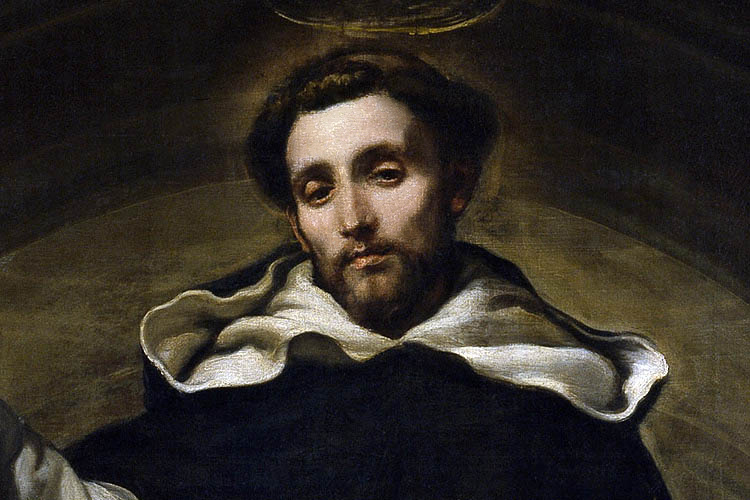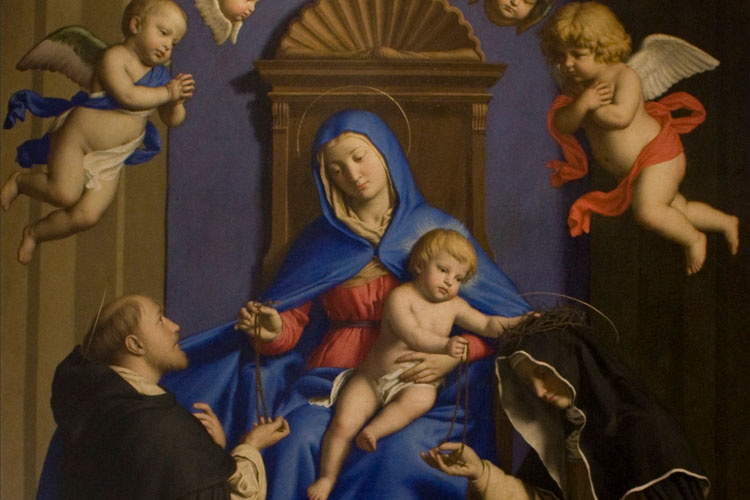Feast Day: 8 August
A highly educated upbringing
Saint Dominic is probably one of the more well-known saints due to his establishing of the Dominicans and success spreading devotion to the rosary. He was born is Spain in 1170 to what would have then been seen as a middle class family.
Dominic was a keen student and became highly educated in the sciences, theology and the arts. As an educated man, St Dominic could have chosen to distance himself from the peasantry; however, his faith inspired him to help those poorer than him in any way he could.
A great example of this was in 1191, when Spain was desolated by famine. Young Dominic gave away his money and sold his clothes, furniture and even precious manuscripts to feed the hungry. When his scandalised fellow students challenged him on this he was passionately said to have responded “Would you have me study off these dead skins, when men are dying of hunger?”
After his study, Saint Dominic moved to the south of France to help combat the Cathar heresy. There were numerous debates and, while he did meet with some success, Dominic became convinced that only preachers who displayed real sanctity, humility and asceticism would really be able to make a difference and convince these heretics of the error of their ways.
Founding the Dominicans
It was to this end that he decided to establish the order of preachers, the order we have now come to know as the Dominicans. These preachers would live a devout and humble life, ensuring they dedicate themselves passionately to the Faith. At the same time, they would be well educated so that they could easily explain the faith to others and help overcome any obstacles people had to Church teachings they’d misunderstood.
To this day, the Dominican Order is one of the fastest growing and passionately active orders both in England and the world.
Devotion to Mary
St Dominic lead a strict and humble personal life, ensuring he abstained from meat, “observed stated fasts and periods of silence”, “selected the worst accommodations and the meanest clothes”, and “never allowed himself the luxury of a bed”. As a person, he was said to be charismatic and fun to be around, easily able to hold a room’s attention with his conversation. He also had a passionate prayer life and a great devotion to Mary.
It was this devotion to Mary that we have to thank for what we now think of when we think of the rosary. St. Dominic was again in south France but, like before, found he was encountering great resistance and little success.
Complaining about this during prayer to our Blessed Lady, she deigned to reply to him, saying: “Wonder not that you have obtained so little fruit by your labours, you have spent them on barren soil, not yet watered with the dew of Divine grace. When God willed to renew the face of the earth, He began by sending down on it the fertilising rain of the Angelic Salutation. Therefore, preach my Psalter composed of 150 Angelic Salutations and 15 Our Fathers, and you will obtain an abundant harvest.”
This Psalter Mary talks of is the full Rosary before the addition of the Luminous mysteries, which only happened in 2002. Before this time, the rosary had existed but its practice was very small and undefined, with many educated people choosing not to prayer it. They did this because until then it had always been seen as the poor and illiterates alternative to praying from a prayer book.
With Mary’s request to Saint Dominic, this attitude changed swiftly. The Dominicans used the rosary as a tool for both their own prayer and a tool to teach others to pray. It created great success for Dominic and he was able to convert many heretics due to its effectiveness.
Why is Saint Dominic Important?
A reflection from someone in our young Catholic community
The reason I like St Dominic is how committed he was to making life better for others, by bringing them to faith. He’s a fantastic example of looking for what needs to change in the world and going out and doing it.
Furthermore, St Dominic’s interactions with the Cathar heretics shows the importance of asking for, and acting upon, guidance in prayer.

